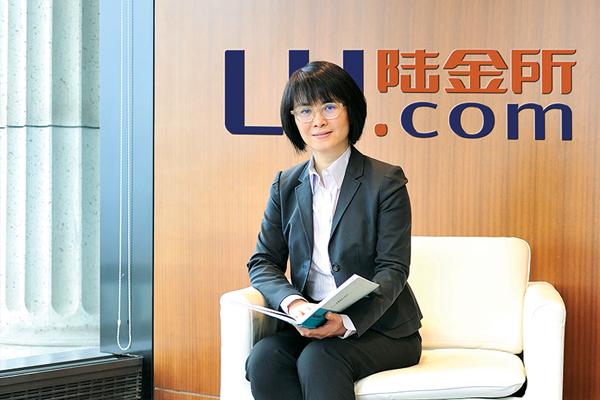
Using unique a development path and innovative models, Shanghai Lujiazui International Financial Asset Exchange (Lufax) has been at the forefront of the avidly watched Internet finance industry. He Songqi, general manager of the Lufax’s Legal and Compliance Department, talks about the company’s history, the impact of scandals related to peer-to-peer (P2P) finance as well as the future of the industry in an interview with Li Shangjing.
ALB: What has been the in-house team’s contribution to Lufax’s product and system innovations in the last couple of years?
He: When Lufax was founded in 2011, we positioned ourselves as an Internet finance company, but at that time, we were also thinking about what Internet finance should be. We call this Era 1.0.
In Era 2.0, Lufax became an open, one-stop wealth management platform, and as we enter Era 3.0, we want to become the largest among such platforms.
In Era 1.0, Lufax mainly provided P2P online lending via its proprietary models and helped individuals access direct investment and financing efficiently and at low costs. We helped match investment and financing needs across different regions, achieve efficient allocation of resources and boost regional economic and financial development.
In Era 2.0, being “open” and “cross industry” was key for Lufax as we focused on providing high value-added services and building a comprehensive platform that covers nine major markets.
Lufax’s Era 3.0 is characterised by “O2O + cross border”. and we aim to build an integrated wealth management platform. We are also looking to provide big data-based asset portfolio management and referral services as well as offer a more diversified range of asset classes to achieve more efficient and cost-effective financing.
Few people knew about P2P lending when we started, and even fewer knew about the legal risks involved. Since our team was set up, we have been exploring the legal positioning and potential legal risks of our business models to help management know about relevant risks and regulatory bottom lines so that they understand the kind of compliance framework needed for our business to sustainably develop. This is what our team has been working hard on.
Looking at Lufax’s history, our ultimate platform-building goal is to develop an all-in, one-stop Internet finance ecosystem to satisfy the various wealth management needs of users at different phases of their lives, giving them more investment options, more diversified investment functions and better user experience.
This is an ongoing process, and Lufax has been continuously rolling out new products. Our in-house team has been significantly involved in designing the positioning and transaction structures of these new products and has provided compliance support in a number of aspects. We always seek to protect investors’ rights and interests by ensuring that the design of transaction structures complies with laws and regulations, despite how opaque current regulatory rules are.
ALB: In your opinion, which part of the P2P industry faces the biggest risks?
He: Currently, financial services are on the cusp of Internet innovation, with substantial room for growth. Bbut the development of the entire industry is uneven. Some agencies operate illegally out of ill intention, and some even escaped with ill-gotten profits. This has negatively affected the development environment of Internet finance. We also hope regulatory rules can be further specified on the basis of an overall regulatory framework in order to standardise and guide the growth of this emerging industry and create a good ecosystem for innovative business.
ALB: Outsiders have widely criticised the P2P as an industry that suffers from chaotic regulation. What do you think should each side do to build an effective P2P regulatory regime?
He: As industry players, we need self-discipline. Nowadays, people have rich imaginations and are good at capitalising on loopholes. But we need to do business with the goal of benefiting the society and achieving sustainability in mind. We can see from all the scandals and negative cases that the companies and individuals involved had the wrong intentions in the first place. They never wanted to contribute to P2P’s development, and instead were only interested in making some quick money when the industry just starting. The essence of Internet finance is finance.
We know that the financial industry is strictly regulated, with higher barriers to entry, clearer exit mechanisms as well as reward and punishment measures. Internet finance, on the other hand, is an innovative industry. Some say it will become disorderly once regulated, but regulation is necessary. We should not ask for laxness just because we are afraid of being too restricted by regulations. Personally, I wish the industry is relatively strictly regulated.
ALB: What is the impact of the Ezubao incident on Lufax and the industry as a whole? Is your listing plan affected? Have you adjusted your internal operations as a result?
He: This incident has not affected our listing plan and direction. But judging from the development of the entire industry, it will cause substantial negative impact if a series of such incidents occur in the future.
Lufax has grown steadily in the past four years, and we have never wavered in monitoring risks of all types. During this time, we established a risk control and management system and a whole-process risk control and management structure. We’ve also built an end-to-end risk management framework and worked to achieve a perfect match between investors and investment products by leveraging big data to provide investors with suitable investment and wealth management services.
ALB: As the Chinese economy slows, businesses have been affected by non-performing loans. Is it true that a factoring company under Lufax is reportedly having RMB 250 million in bad debts? What precautionary measures has Lufax taken to deal with such debts?
He: Given Lufax’s current size, there are indeed some individual cases, but they do not involve sales to investors via the online platform. At present, our Internet finance business is not affected by non-performing loans.
Lufax has a risk control center designed to strictly monitor the entry and selection of the assets provided by our partners and conduct risk ratings on both internal and external assets. This allows us to minimise the possible damage to investors as a result of our partners’ unqualified assets.
Additionally, our risk control personnel conduct KYC procedures on investors’ risk affordability and strive to help investors find investment products and wealth management services that match their risk tolerance.
ALB: How does Lufax’s in-house team look at the issues related to P2P legislation and regulation?
He: The industry itself has an Internet finance committee, and there is even an online lending alliance in Shanghai. These are organisations that count P2P industry practitioners as members. Lufax and other P2P players have developed and implemented mechanisms such as individual-individual credit rating and blacklists. We have also been thinking about whether we can forge a common stance within the alliance.
Lufax has long maintained communications with regulators. The Supreme People’s Court and the China Banking Regulatory Commission (CBRC) have also visited our company. We will submit our suggestions for the P2P industry to relevant authorities in writing.
ALB: Following the exposure of risks in the P2P industry, some say Lufax is in the process of “de-P2Ping”. What is your response to this?
He: Lufax’s very first business was private P2P lending, which has now entered Era 3.0. In terms of our development path, we hope to build Lufax into a wealth management platform. When you begin to see Lufax provide an increasingly diversified product portfolio, you may wonder if the company no longer engages in P2P. But it is not so simple. Because we ultimately want to create an all-in Internet finance ecosystem, we envision that Lufax’s platforms will not only have providers of assets, products and investors, but also payment institutions, rating agencies and other participants. In addition, our Internet finance ecosystem is an open system, which welcomes any resource or service, as long as they meet the required standards.
ALB: The P2P industry has seen its reputation falling amid a faltering economy. In your opinion, how will the industry develop in the future? Are you upbeat about its prospects?
He: Internet finance is not just about P2P, and an increasing number of new forms are emerging. Just as Lufax’s development started with P2P, services provided by Internet finance are growing continuously. I believe that the development of Internet finance always has a positive and increasingly important impact on finance.
Based on CBRC’s consultation paper, P2P refers to direct lending between individuals. The P2P industry serves small and medium-sized enterprises (SMEs) and emerging industries, which have large funding demand but face difficulty in accessing direct financing. I think P2P is very helpful for small and micro industries. From the perspective of SME lending, I am upbeat about the P2P industry, despite the realities of the economic downturn.
As long as industry players practise self-discipline and continue with product innovation, I am confident that the P2P industry enjoys great prospects because China needs such a financing model to support the growth of its real economy.
ALB: What advice or experiences can you share with your peers in the Internet finance industry?
He: Although I majored in law, Internet finance has prompted me to continue learning. Actually, what we’ve been doing so far is “crossing the river by feeling the stones” because there are few available examples to follow or experiences to learn from. Whatever experience we have is gained from our own practical work. As a legal professional, I can really bank on my professional expertise and solid legal knowledge in this emerging field to offer sensible suggestions for innovation. If we continue to be enthusiastic about the industry and pass on the lessons from our experiences at the front lines, we will have very promising career prospects as the industry grows. In my view, doing legal work in the Internet finance industry can easily showcase the value of in-house counsels.
2016 promises to be very special, as we expect to see the introduction several regulatory rules. Throughout this process, our in-house team hopes to strengthen Lufax’s compliance system, in addition to addressing legal issues. This is also one of our top priorities this year.


